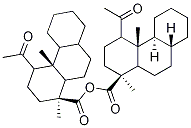Description
The liver X receptors (LXRα and LXRβ) are nuclear hormone receptors whose native ligands are oxysterols.
1 Acetyl podocarpic acid anhydride (APD) is a potent, semisynthetic LXR agonist derived from extracts of the mayapple. APD acting through LXR in concert with the retinoid X receptor (RXR), its heterodimerization partner, induces the expression of the ABCA1 reverse cholesterol transporter.
2 This acts to increase the efflux of cholesterol from enterocytes and thus inhibits the overall absorption of cholesterol (ED
50 value of 1 nM).
3 In transient transactivation assays, APD was found to be approximately 1,000 times more potent and have 8-10-fold greater maximal stimulation of LXR than 22(R)-hydroxy cholesterol.
3,4 APD can be used as a positive control for the testing of LXR agonists, which have potential as therapeutic agents for the treatment of atherosclerosis.
References
1. Repa, J.J., Turley, S.D., Lobaccaro, J.M.A., et al. Regulation of absorption and ABC1-mediated efflux of cholesterol by RXR heterodimers Science 289(5484),1524-1529(2000).
2. Costet, P., Luo, Y., Wang, N., et al. Sterol-dependent transactivation of the ABC1 promoter by the liver X receptor/retinoid X receptor J. Biol. Chem. 275(36),28240-28245(2000).
3. Sparrow, C.P., Baffic, J., Lam, M.H., et al. A potent synthetic LXR agonist is more effective than cholesterol loading at inducing ABCA1 mRNA and stimulating cholesterol efflux J. Biol. Chem. 277(12),10021-10027(2002).
4. Singh, S.B., Ondeyka, J.G., Liu, W., et al. Discovery and development of dimeric podocarpic acid leads as potent agonists of liver X receptor with HDL cholesterol raising activity in mice and hamsters Bioorg. Med. Chem. Lett. 15(11),2824-2828(2005).

